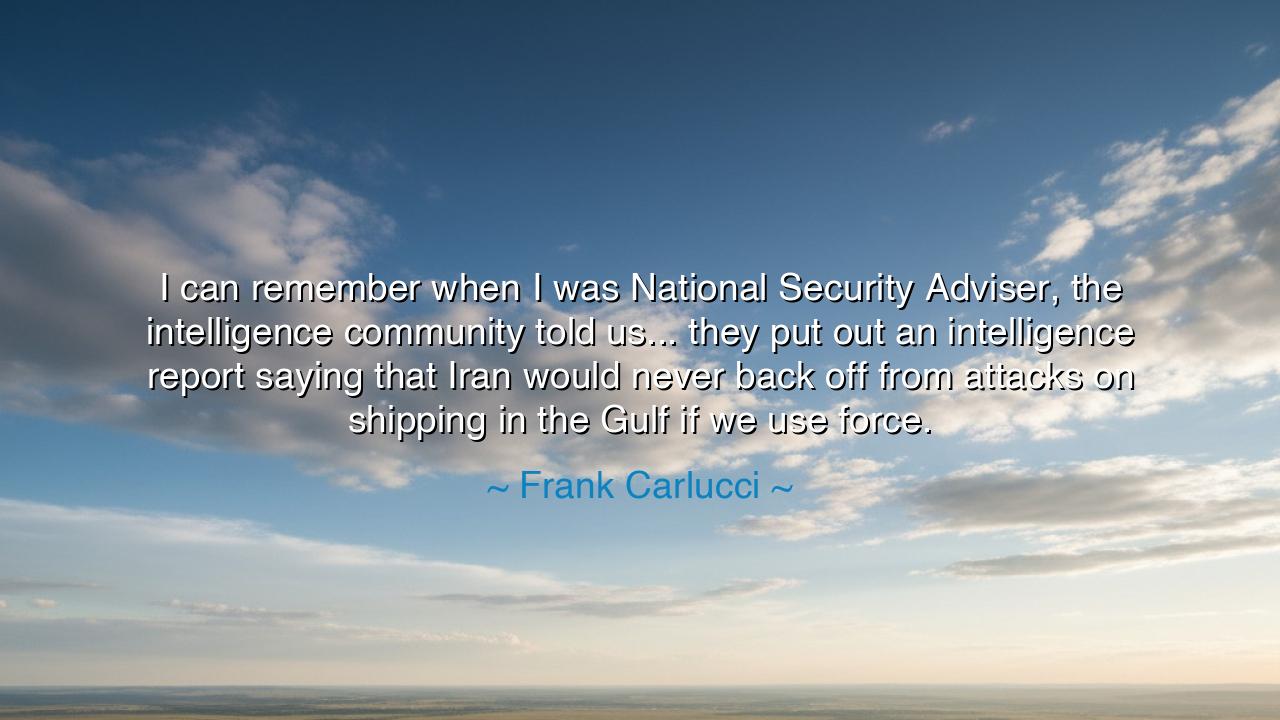
I can remember when I was National Security Adviser, the
I can remember when I was National Security Adviser, the intelligence community told us... they put out an intelligence report saying that Iran would never back off from attacks on shipping in the Gulf if we use force.






In the halls of power, where decisions shape the fate of nations, the words of Frank Carlucci ring with the gravity of experience: “I can remember when I was National Security Adviser, the intelligence community told us... they put out an intelligence report saying that Iran would never back off from attacks on shipping in the Gulf if we use force.” These are not casual recollections, but echoes of the timeless tension between knowledge and action, between prediction and courage. Carlucci’s reflection reveals a truth as old as governance itself—that wisdom often lies not in the certainty of advisors, but in the discernment of those who must decide when to act despite uncertainty.
In every age, leaders have stood before the veil of the unknown, surrounded by counselors who claimed to foresee the outcome of every move. The intelligence community, like the oracles of Delphi in ancient Greece, offers glimpses into possible futures. Yet even the most gifted seers are bound by human limitation. When Carlucci recalls their warning—that Iran would never yield, even under pressure—he invites us to ponder the fragile balance between the foresight of analysis and the unpredictability of human resolve. Nations, like men, are not ruled solely by logic. Pride, fear, and survival all dwell in the unseen chambers of the heart.
To understand the depth of this quote, one must return to its origin in the turbulent 1980s, when the Persian Gulf was a theater of shadow wars and silent rivalries. The attacks on shipping lanes were more than mere acts of aggression; they were tests of will between nations seeking dominance and dignity. The advisers’ words reflected the wisdom of caution—they saw defiance as inevitable. But in the grand arc of history, such moments remind us that prophecy is not destiny. As time unfolded, diplomacy, deterrence, and determination each played their part, and the tides of the Gulf, once aflame, gradually found uneasy calm.
This tension between intelligence and intuition can be seen again and again across the ages. When Winston Churchill warned his countrymen of the rising storm in Europe, his words were dismissed by those whose intelligence reports favored peace and denial. The lesson was costly: sometimes those who see danger are ignored, and sometimes those who predict disaster underestimate human adaptability. Carlucci’s memory is thus not a boast, but a meditation on this ancient paradox—how even the wisest counsel can falter when faced with the unpredictable force of human will.
To use force or restraint, to trust or question, to act or wait—these choices define not just nations but individuals. Carlucci’s reflection teaches us the value of humility in judgment. The intelligence report may have been logical, but logic alone cannot account for the mysteries of conviction. Just as generals must study not only maps but men, so too must each of us learn to balance analysis with intuition, reason with courage. For wisdom lies not in knowing the outcome, but in understanding the forces that move the hearts of others.
There is a deeper moral hidden in these words: that truth is never complete when viewed from one vantage alone. The intelligence analysts saw patterns of behavior; Carlucci saw the living world beyond those patterns. In this, we find a lesson for all who lead or decide—for the scholar, the commander, the parent, the dreamer. Do not cling too tightly to the counsel of certainty, for certainty blinds as easily as ignorance. Instead, weigh all things, and act from a place of understanding that includes both reason and spirit.
And so, let this teaching stand firm through the ages: knowledge is a compass, not a command. The one who wields it must still navigate storms of doubt and winds of change. As Carlucci’s recollection reminds us, the world will always resist the neat predictions of the mind. But in the hands of those who think deeply, feel wisely, and act with courage, even uncertainty becomes a source of strength. The future, after all, is not written by those who know—it is written by those who dare.






AAdministratorAdministrator
Welcome, honored guests. Please leave a comment, we will respond soon